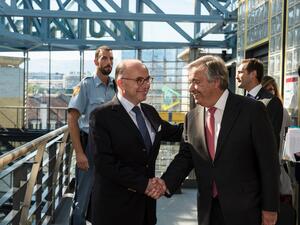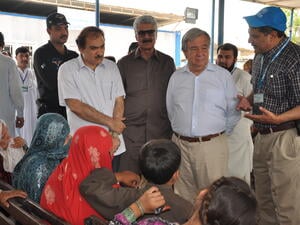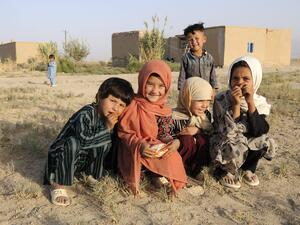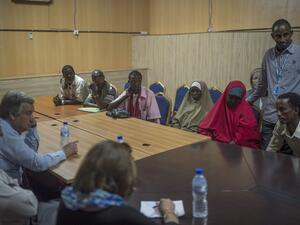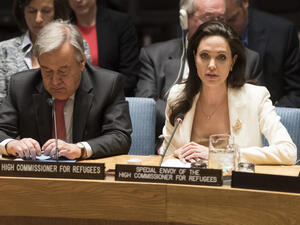Guterres visits Iraq; announces strengthened UNHCR presence
Guterres visits Iraq; announces strengthened UNHCR presence

High Commissioner António Guterres meets an internally displaced Iraqi at a camp near Erbil, northern Iraq.
BAGHDAD, Iraq, February 18 (UNHCR) - UN High Commissioner for Refugees António Guterres on Monday concluded a two-day mission to Iraq, where he pledged to strengthen UNHCR's presence and offered to work with the government on a preliminary assessment of the conditions required for the eventual return of millions of uprooted Iraqis.
Guterres, winding up a weeklong visit to Jordan, Syria and Iraq, said UNHCR would boost its Baghdad-based staff from two to five internationals. UNHCR and other UN agencies have had a limited international presence in the Iraqi capital since the deadly bombing of UN headquarters there in August 2003.
The refugee agency works in seven locations throughout the country, primarily through national staff and non-governmental organizations, with activities often managed from Amman, Jordan.
In a joint press conference in Baghdad, Iraqi Foreign Minister Hoshyar Zebari welcomed the enhanced UNHCR presence as "very good news." Guterres said it would allow his staff to work much more closely with the government in providing humanitarian help to tens of thousands of internally displaced Iraqis as well as to begin laying the groundwork for the eventual return of refugees when the necessary conditions are in place.
"I confirm our commitment to increase our international presence in Baghdad from two to five in the immediate future," Guterres said. "Our deputy representative in Iraq is already sitting in Baghdad and working together with the government in areas of common concern ... and the new representative who will be appointed will also be based in Baghdad and no longer in Amman. We believe it is clear that the central work needs to be done there in close cooperation with the government."
The High Commissioner - on his second mission to the Iraqi capital in a year - said UNHCR would intensify its humanitarian work inside the country as part of a joint UN effort. Another key aspect of the strengthened UNHCR presence would be to begin preparing for the return of some of the 2 million Iraqi refugees outside the country. Around 2.4 million others are internally displaced.
"There is never a humanitarian solution for a humanitarian problem - the solution is always political," Guterres said. "The plight of Iraqi refugees will end with national reconciliation and with their effective reintegration and their contribution to the reconstruction of the country. That's our common objective."
The proposed joint assessment would analyze the conditions needed to be in place for the successful and sustainable return of refugees. "Our key common interest is that the returns will take place voluntarily, in safety, in dignity and in a sustainable way - contributing to the future reconstruction of Iraq," the High Commissioner said.
In addition to safety and security, he said basic pre-conditions for the return of refugees include access to and the availability of basic services, and restitution or compensation for lost property.
Guterres also held discussions with Prime Minister Noori Al Maliki, Deputy Prime Minister Barham Salih and the ministers of interior, human rights and displacement and migration. He also met the speaker of the Iraqi Parliament, Mahmoud al-Mashhadani, and held talks with the special representative of the UN Secretary-General in Iraq, Staffan de Mistura.
His talks with Iraqi officials also covered ways of strengthening assistance and protection to Iraqi refugees in nearby host countries such as Jordan and Syria, and the further substantive involvement of the Iraqi government.
"I have been in the past few days both in Syria and Jordan with hundreds of Iraqi refugees and I could feel how proud they are to be Iraqis, how much they want to be part of the reconstruction of the country and how much they want to engage with their government and to see their own government's support to alleviate their situation," Guterres said.
On Sunday, the High Commissioner travelled from Baghdad to Erbil, in northern Iraq. He met with several officials of the Kurdistan Regional Government, including President Masoud Barzani and Deputy Prime Minister Omer Fattah, before visiting a camp for some 150 displaced Iraqi families who had fled their homes in the Mosul area in 2005.
"It's a pity that in such a rich country with so many opportunities you are condemned to be caught in such tragic circumstances," he told a group of displaced men in the camp outside Erbil. "I hope things will improve, that peace will return and that you can finally go home."
By Ron Redmond in Baghdad and Erbil, Iraq


